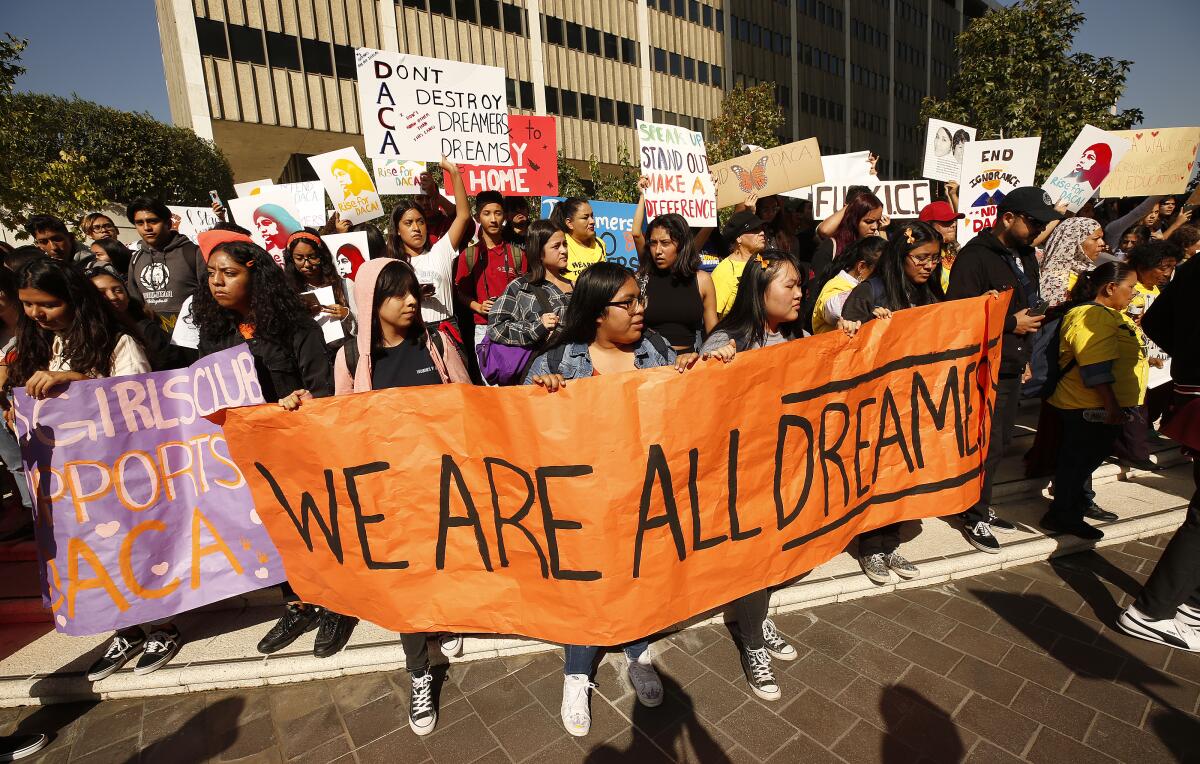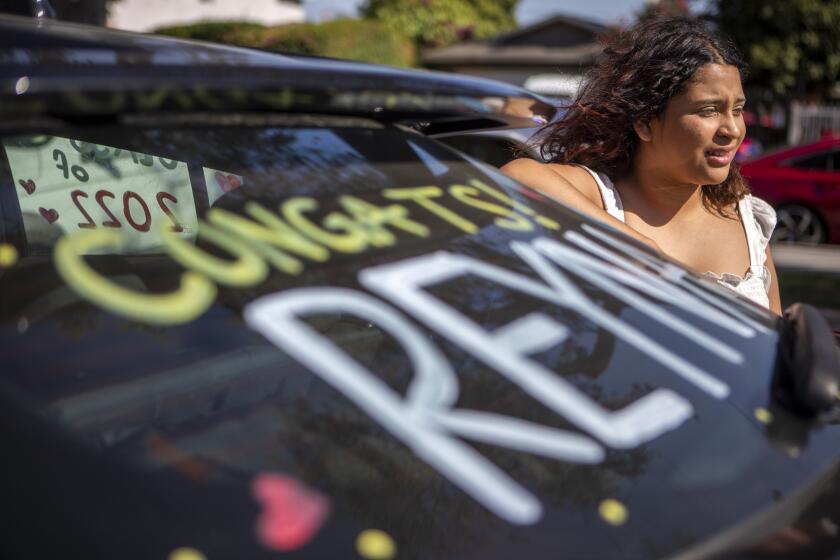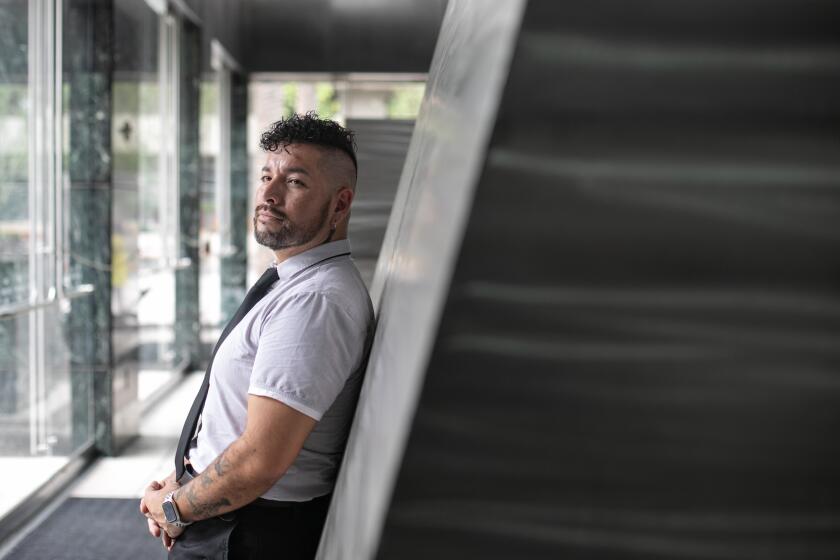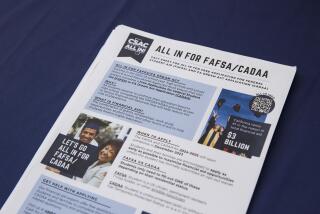UC pushed to break legal ground by hiring immigrant students without work permits

- Share via
The University of California is considering a proposal to break legal ground by hiring immigrant students without work authorization in what would be a test of federal law that could dramatically alter tens of thousands of young lives.
A coalition of UC students and scholars across the nation are urging the UC system to challenge a 1986 federal law barring the hiring of immigrants without legal status by asserting a novel legal argument that it does not apply to states. California is home to 1 in 5 of the nation’s college students without legal authorization.
Such students were given a lifeline under the Obama-era Deferred Action for Childhood Arrivals program — better known as DACA — which granted work permits and protection from deportation to certain youth who were brought to the United States as children and are in the country without legal status.
But the future of DACA is in jeopardy. The Trump administration ended the program five years ago, and a court ruling limited the government to only granting DACA renewals — not accepting new applications — which has shut out a new generation of recipients. This year, an estimated 100,000 immigrant youth graduated from high school without legal status or DACA benefits — including about 27,000 in California. About 44,000 students without DACA attend California colleges, which means many are prohibited from entering the labor market.
“At the University of California, students who cannot access DACA are being systematically denied opportunities afforded to their classmates, including employment opportunities that would enhance the research, education, and public service mission of the university,” nine UCLA students and scholars wrote to UC President Michael V. Drake in a letter released Wednesday. “This unfair treatment of our undocumented students must end, and the University has legal authority to end it.”
But whether UC — whose students in the last three classes since fall 2020 have not been eligible for DACA — will take such a bold step is unclear.
Richard Leib, chair of the UC Board of Regents, said he was intrigued by the innovative legal proposal — particularly because such noted constitutional scholars as Erwin Chemerinsky, dean of UC Berkeley‘s School of Law, are supporting it.
“It’s a brand-new novel idea and of course I would love to do it if feasible,” Leib said in an interview. “But I want to review it closely so it doesn’t have any unintended consequences and doesn’t end up hurting our undocumented students.”
Ten years after Obama launched the Deferred Action for Childhood Arrivals program, immigrant youths are graduating high school this year with no immigration relief or protection from deportation.
Maria Blanco, who recently stepped down as head of the UC Immigrant Legal Services Center, said the university will need to weigh myriad factors.
“I think they’ll be very, very cautious about it,” Blanco said. “That doesn’t mean it’s not a strong legal argument. It’s really going to be a political issue: Are we going to get sued? They’ll have to make a calculation about whether the threat of litigation outweighs the benefit to students.”
Abraham Cruz Hernandez, a fifth-year UCLA student who directs the systemwide Undocumented Student-Led Network, said he was told in a September meeting with Drake’s staff members that the university would not hire students without work authorization. He said he and other activists are campaigning to change that by mobilizing students across the UC system and appealing to regents and other allies.
UC said in a statement Wednesday that hiring such students “would be a departure from past practice by the University, as it would for most employers.” But the statement added:
“The University of California has long been committed to supporting our undocumented students. ... These are complex issues that deserve careful and thoughtful review. We have received the proposal and are in the process of determining the appropriate next steps for its consideration.”
Jeffry Umaña Muñoz, a third-year UCLA student, can describe how life would dramatically change for him if he were able to legally work. He is eligible for DACA but has not been able to acquire the status because then-President Trump rescinded the program as he was about to apply. He filed an application in January 2021 under the new Biden administration, but a court order has frozen all petitions.
He said he has lived precariously and raised $3,000 on GoFundMe last summer to cover a shortfall for housing and tuition. He has lived on donated grocery cards, loans and visits to campus food pantries. And he was denied a seat on the UCLA undergraduate student council because the campus said it could not compensate him for the paid position.
“I’ve had to fight for existence, each and every day,” said Muñoz, who was brought to the United States from El Salvador at age 2.
He said his situation has filled him with anger and frustration — but also fired his passion to learn and make a difference through activism.
UC campuses, pushed by student activists, have launched fellowships for students without legal status — state-funded fellowship and grant funds are allowed, unlike wages. Muñoz, for instance, received a $5,000 stipend for such work as creating resource guides for students without legal status at UCLA’s Career Center.
The state Legislature has also tried to fill the gap with programs to provide grants to students, including those without legal status, in exchange for public service and volunteer work.
But UC student activists say such programs are not nearly enough. UCLA offers only 10 to 20 fellowships at a campus with hundreds of students without legal status, Hernandez said.
More and more young immigrants without legal status are turning to entrepreneurship.
“It’s clear to us that fellowships aren’t a substitute for full employment,” said Carlos Alarcón, who was brought to the United States from Mexico at age 5 and is a UCLA graduate student in public policy who has pushed for more resources for students without legal status for the last six years.
A 2020 study led by UC Irvine found that 96% of 1,300 UC and California State University undergraduates without legal status worried about financial shortfalls and 59% didn’t always have enough to eat. Nearly three-fourths said they needed professional mental health services.
Those strains are not likely to ease any time soon. The DACA policy continues to be litigated and is likely to reach the U.S. Supreme Court.
The 1986 Immigration Reform and Control Act, signed by President Reagan, granted residency to about 3 million people in the country without legal status and for the first time established penalties on those who hired workers without papers. Ever since, the law has been interpreted to bar the employment of noncitizens who lack work authorization.
The Center for Immigration Law Policy at the UCLA School of Law is now challenging that long-accepted assumption in a new legal analysis, arguing that states and certain state entities are exempt from the federal law.
The federal law doesn’t mention states at all, said Astghik Hairapetian, an attorney and law fellow for the UCLA immigration law center.
In addition, Hairapetian and other scholars argue that states have broad power to determine the appropriate qualifications for states positions, including qualifications related to immigration status.
A memo signed by 28 immigration and constitutional scholars argues that before IRCA, the U.S. Supreme Court established that if Congress wants to change the balance between federal and state power by regulating an area under traditional state control, it must do so with unmistakably clear language.
“Congress was not clear. ... It is sort of something that I feel like was hiding in plain sight,” Hairapetian said. “Very often we don’t look very carefully. ... Unfortunately, right now, it’s very important given the lack of real solutions.”
Hairapetian, who did research on the issue, said it was “born out of real dire necessity.”
But others expressed skepticism.
Mark Krikorian, executive director for the Center for Immigration Studies, a Washington, D.C., group that favors immigration restrictions, called UCLA’s new legal analysis a “frivolous argument” and a “desperate attempt” to circumvent the legislative process.
“They can’t get Congress to agree to amnesty illegal immigrants so they are coming up with any cockamamie idea they can to try to move the ball forward,” he said.
Muzaffar Chishti, director of the nonpartisan Migration Policy Institute at the New York University School of Law, described the center’s move as a “very challenging argument.”
Chishti, who was present at the negotiations for the IRCA sanctions provision, said excluding states from the hiring ban never came up for discussion.
“There was nothing to suggest in the legislative history that Congress did not intend it to apply to states,” said Chishti. “I think it’s an uphill battle. … This is pushing the envelope.”
For Muñoz, however, winning the right to be paid for meaningful work would be an affirmation that he was a full UCLA student, equal to all.
“For me, this is a chance to be a UC student once and for all,” he said.
More to Read
Sign up for Essential California
The most important California stories and recommendations in your inbox every morning.
You may occasionally receive promotional content from the Los Angeles Times.














